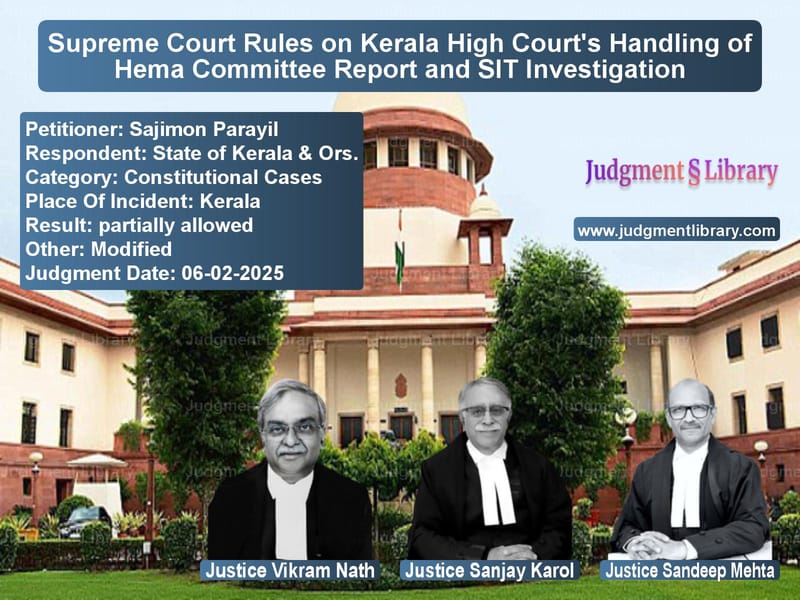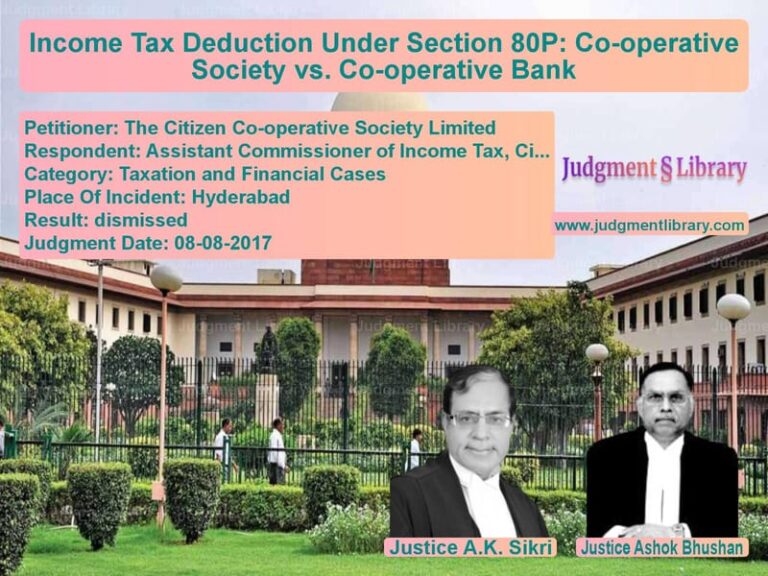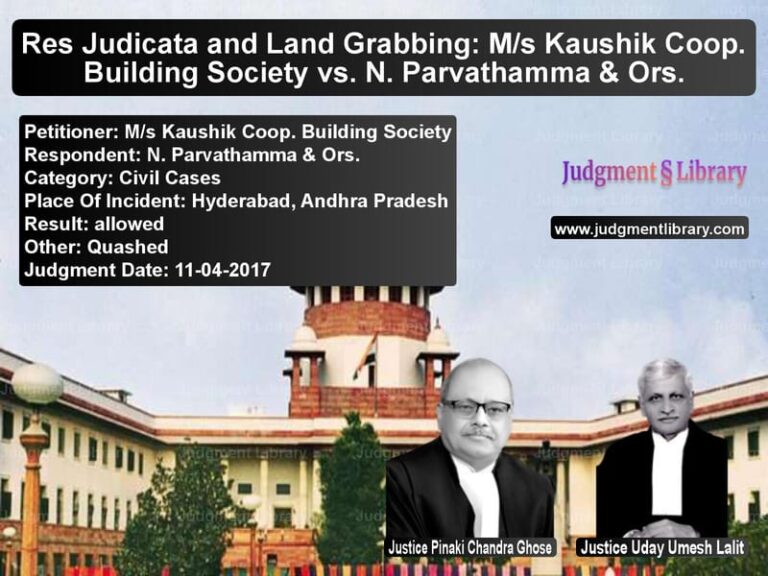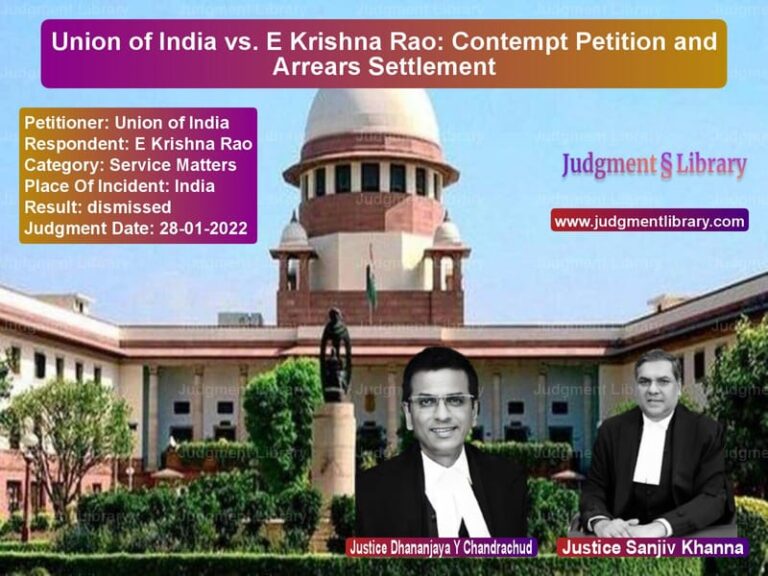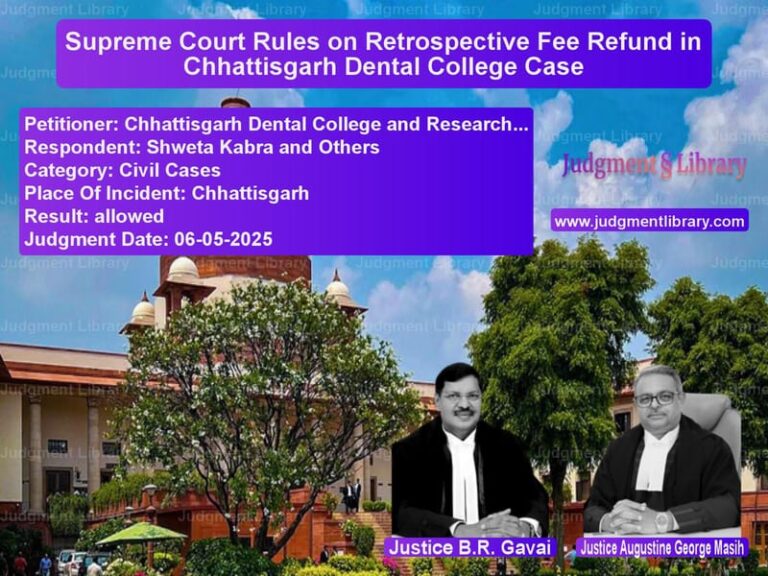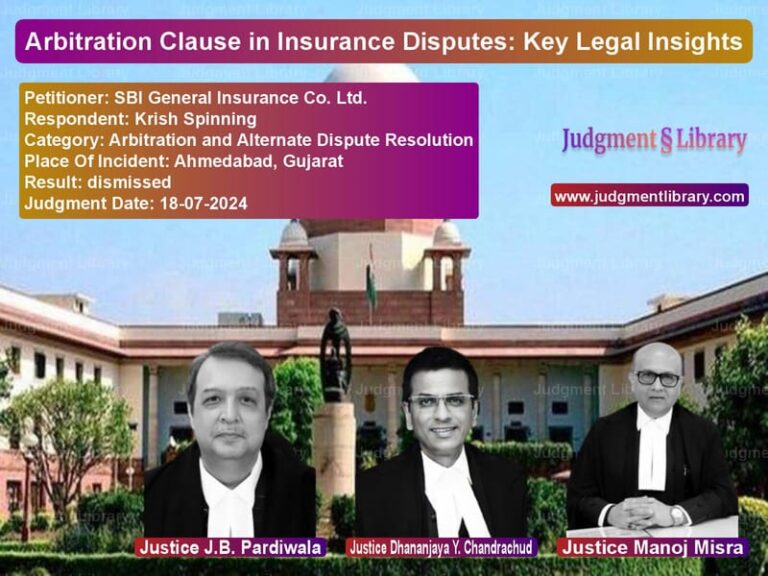Supreme Court Rules on Kerala High Court’s Handling of Hema Committee Report and SIT Investigation
The Supreme Court, in the case of Sajimon Parayil vs. State of Kerala & Ors., examined the legal issues surrounding the Kerala High Court’s directives regarding the Hema Committee Report on the working conditions of women in the Malayalam film industry. The judgment is significant as it touches upon privacy rights, procedural fairness, and the powers of a Special Investigation Team (SIT) in handling allegations of misconduct.
Background of the Case
The case arises from the Kerala government’s appointment of the Hema Committee in 2017, following concerns raised by the Women in Cinema Collective (WCC) regarding gender discrimination and harassment in the Malayalam film industry. The committee, chaired by retired High Court Judge Justice K. Hema, submitted its report on December 31, 2019. However, the report was not acted upon for a long time, leading to legal challenges.
Key legal issues in the case:
- Should the Hema Committee Report be made public?
- Can the Kerala High Court monitor the implementation of the report?
- Did the SIT, formed after the report’s submission, act within legal limits?
- Were individuals unfairly pressured to give statements to the SIT?
Legal Proceedings and High Court Ruling
Several petitions were filed before the Kerala High Court, with different stakeholders taking conflicting positions:
- Some petitioners sought the publication of the Hema Committee Report.
- Others, including the petitioner in this case, sought to prevent its disclosure, citing privacy concerns.
- The High Court directed the Kerala government to produce the report in a sealed cover.
- A Special Investigation Team (SIT) was formed under the Commissioner of Police, Thiruvananthapuram, to examine potential criminal offenses mentioned in the report.
The High Court monitored the investigation and issued several directives regarding media coverage and police actions.
Arguments Before the Supreme Court
Petitioner’s (Sajimon Parayil) Arguments
The petitioner’s legal counsel contended:
- Disclosing the Hema Committee Report would violate the privacy of individuals who testified.
- The Kerala High Court’s intervention in monitoring the SIT’s investigation was beyond its jurisdiction.
- Many individuals were being coerced into giving statements to the SIT.
- Since no FIR had been registered against the petitioner, he lacked standing to challenge the report’s publication.
Respondents’ Arguments
The respondents, including the Kerala government and Women in Cinema Collective, argued:
- The Hema Committee Report was a matter of public interest.
- The High Court’s monitoring was necessary due to the government’s inaction.
- The SIT was following proper legal procedures in its investigation.
- Individuals who did not wish to testify before the SIT were not being coerced.
Supreme Court’s Observations
The Supreme Court bench, comprising Justices Vikram Nath, Sanjay Karol, and Sandeep Mehta, reviewed the case and made the following key observations:
“The fundamental right to privacy must be protected, particularly in cases involving sensitive personal testimonies. However, legal accountability cannot be undermined in the name of privacy.”
The Court further clarified:
- The Kerala High Court had the authority to monitor the implementation of the Hema Committee’s recommendations.
- However, individuals could not be forced to testify before the SIT against their will.
- The SIT’s actions should be subject to judicial scrutiny to prevent abuse.
Final Judgment
The Supreme Court ruled:
- The Kerala High Court’s order requiring the state government to produce the report in a sealed cover was upheld.
- The High Court’s observations on monitoring the investigation were modified to clarify that individuals could not be compelled to testify.
- Individuals feeling harassed by the SIT were granted the right to approach the High Court for relief.
- The media was advised to exercise restraint in reporting on the case to prevent undue influence on the investigation.
Key Takeaways
- Privacy vs. Public Interest: The judgment balances privacy rights with the need for transparency.
- Judicial Oversight on SIT Actions: Courts must ensure that investigative bodies do not exceed their legal limits.
- Right Against Coerced Testimony: Witnesses cannot be forced to cooperate with an investigation.
- Media Responsibility: The ruling emphasizes responsible reporting in sensitive cases.
Conclusion
The Supreme Court’s judgment provides crucial guidance on handling sensitive investigative reports and upholds the principle that fundamental rights cannot be sacrificed in the pursuit of justice. While ensuring legal accountability, the ruling also reinforces protections against undue state action.
Petitioner Name: Sajimon Parayil.Respondent Name: State of Kerala & Ors..Judgment By: Justice Vikram Nath, Justice Sanjay Karol, Justice Sandeep Mehta.Place Of Incident: Kerala.Judgment Date: 06-02-2025.
Don’t miss out on the full details! Download the complete judgment in PDF format below and gain valuable insights instantly!
Download Judgment: sajimon-parayil-vs-state-of-kerala-&-or-supreme-court-of-india-judgment-dated-06-02-2025.pdf
Directly Download Judgment: Directly download this Judgment
See all petitions in Fundamental Rights
See all petitions in Public Interest Litigation
See all petitions in Legal Malpractice
See all petitions in Judgment by Vikram Nath
See all petitions in Judgment by Sanjay Karol
See all petitions in Judgment by Sandeep Mehta
See all petitions in partially allowed
See all petitions in Modified
See all petitions in supreme court of India judgments February 2025
See all petitions in 2025 judgments
See all posts in Constitutional Cases Category
See all allowed petitions in Constitutional Cases Category
See all Dismissed petitions in Constitutional Cases Category
See all partially allowed petitions in Constitutional Cases Category

